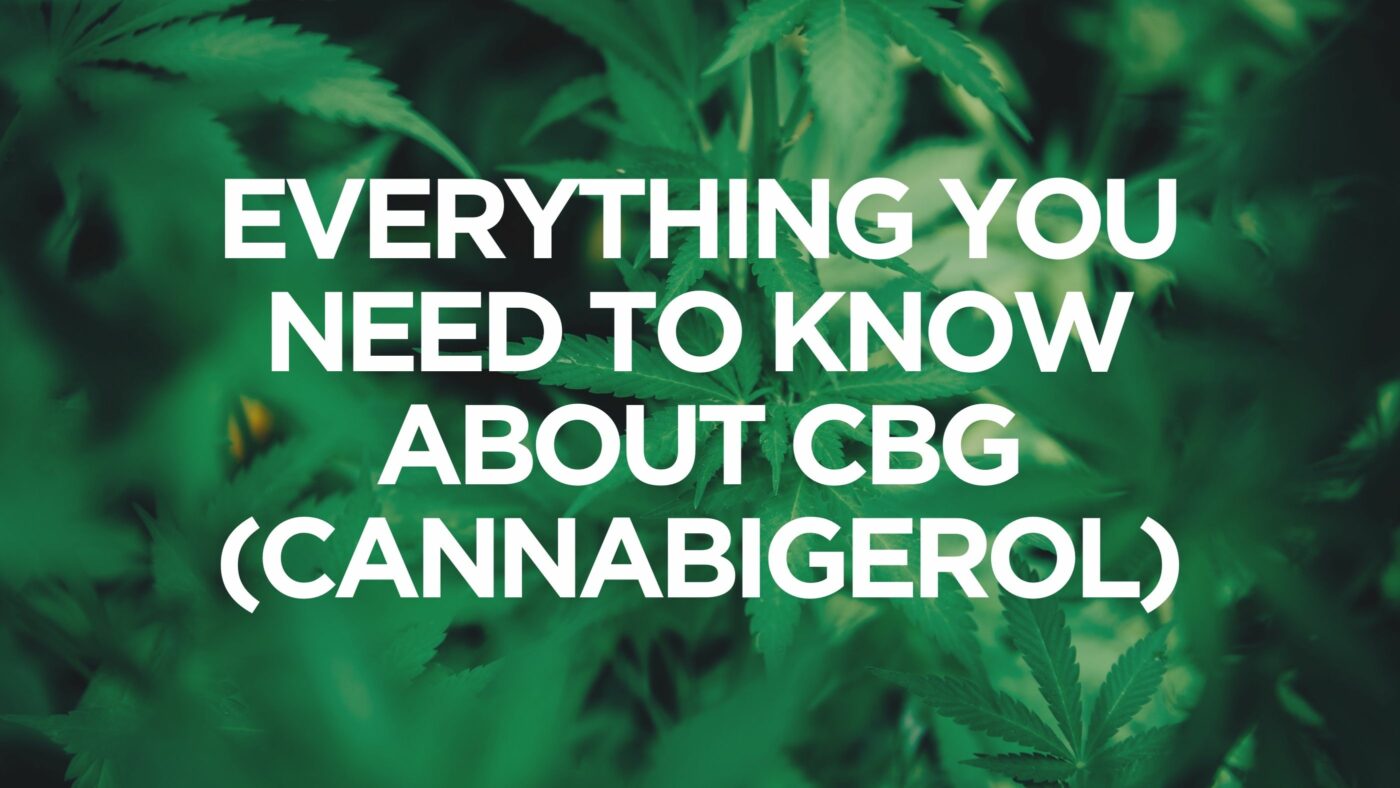blog
Everything You Need to Know About CBG (Cannabigerol)
There are over 400 chemical compounds found in the cannabis plant, and more than 100 of them are classified as cannabinoids. Among all these cannabinoids, THC and CBD stand out as the most prevalent in the cannabis industry. THC is the psychotropic compound that causes the illustrious marijuana high, while CBD is the non-psychoactive cannabinoid well-recognized for its medicinal benefits.
Aside from THC and CBD, other cannabinoids are emerging. One of them is cannabigerol (CBG), a rare compound in mature cannabis plants. It is usually found more in younger cannabis and is a parent compound for THC, CBD, and other cannabinoids. This article will dive into more detail into this particular substance and determine its benefits and uses.
What is CBG?
CBG was discovered in the 1960s by pioneer cannabis researchers Raphael Mechoulam and Yechiel Gaoni. It is present in both psychoactive marijuana and non-psychoactive hemp. Both CBD and CBG are similar because they do not have any psychoactive effects, and therefore, they do not alter the consciousness, unlike THC.
CBG is a mother molecule of other active compounds in cannabis, and its presence in the plant is essential in the biosynthesis of many cannabinoids. Without it, there would not be any cannabinoids in the plant. As the plant grows, it gets exposed to sunlight, heat, and oxidation, which affect the transformation of cannabigerolic acid (CBGA), the acidic form of CBG, into other compounds such as CBD and THC.
As cannabis matures, most of the CBG molecules transform into other cannabinoids. Because of this, its concentration drops below 1%. There is an increasing demand to produce higher yields of additional cannabinoids. Hence, breeders started experimenting on cross-breeding strains to create varieties with higher concentrations of CBG.
The cannabis community is attracting a lot of interest in CBG, CBN, CBC, and other compounds that can enhance the effects of CBD or even surpass it. These substances promise a lot of therapeutic benefits that may revolutionize medical science. Not surprisingly, there is a continuing effort to study these benefits for the advantage of the human population.
How CBG is Produced
CBG has low concentrations in mature cannabis plants and is primarily derived from young plants that contain significant amounts of it. Most cultivators produce greater concentrations from high CBG strains like Jack Frost CBG and White CBG.
Younger cannabis plants contain more CBG because the CBGA has not yet been transformed into other cannabinoids. When the plants have fully developed, the concentration of CBG decreases to less than 1%. With genetic manipulation and experimentation, cultivators may soon produce strains that produce high levels of CBG.
CBG Vs. CBD
CBG is somewhat similar to CBD in many aspects, but they also have their differences. For instance, CBD and CBG work the same way as other cannabinoids because they interact with the endocannabinoid system. They are both non-psychotropic which means that they will not cause mind-altering effects. They are beneficial to the body because they are anti-inflammatory and may combat chronic pain, depression, and anxiety.
A significant difference in both cannabinoids is their concentration in developed cannabis plants. When cannabis matures, it will only have around 1% or less CBG content, whereas it may contain up to 25% of CBD. Therefore, extracting significant amounts of CBD is much easier than CBG from the cannabis plant. Nevertheless, CBG is much more concentrated in younger cannabis plants than mature ones.
It is important to note that CBG is the parent molecule of CBD and other cannabinoids. Cannabinoids always start as CBG before they convert into their respective forms. Therefore, there is a low concentration of CBG in marijuana and hemp because of the conversion. It is one of the reasons why there has been more research into CBD than CBG in the past.
Both cannabinoids may look identical, except for a slight difference in atomic content. The chemical formula for CBG is C21H32O2, while the chemical formula for CBD is C21H30O2. From the chemical formula alone, we can see that CBG has more hydrogen atoms. Also, their atomic structures are arranged differently from each other.
Because of their differences in chemical structure, it is more likely that CBD and CBG interact with the cannabinoid receptors differently. For instance, CBD activates the 5-HT1A serotonin receptor while CBG blocks it. Also, CBD does not bind easily with the cannabinoid receptors, while CBG interacts mainly with the CB2 receptor.
How CBG Affects the Body
CBG interacts with the body’s endocannabinoid system, a complex arrangement of cannabinoid receptors and endocannabinoids. The body produces endocannabinoid compounds to help regulate physiological functions and maintain homeostasis by interacting with the CB1 and CB2 cannabinoid receptors.
The CB1 receptors are located primarily in the brain and the central nervous system. The CB2 receptors are distributed in other body parts but mainly in the immune system. The two most prominent endocannabinoids that bind with these receptors are 2-arachidonoylglycerol (2-AG) and anandamide (AEA). When 2-AG binds with both receptors, it produces anti-inflammatory properties. When anandamide binds with CB1 receptors, it affects mood and cognitive function.
Cannabinoids from plants have the same shape as endocannabinoids, which allows them to bind with the CB1 and CB2 receptors in the human body. For example, when THC binds with the CB1 receptors, it causes mind-altering effects, which we commonly refer to as the “high.” CBD binds weakly to the receptors, but it can antagonize their reaction to THC and other cannabinoids. Therefore, THC does not usually produce adverse intoxicating effects when CBD is present.
Previous research shows that CBG acts mainly with the CB2 receptors. When taken in high doses, it may prevent other cannabinoids from binding with the CB1 receptors. Nevertheless, it does not affect the effects of THC, unlike CBD.
Preliminary research on the interaction between cannabinoids and how they affect the endocannabinoid system gave rise to the idea called the ‘entourage effect.’ Experts are still trying to understand how it works and impacts cannabis use. Some speculate that using cannabinoids in combination can provide more benefit to the body than taking them individually.
In the case of CBG, it may help intensify the relaxing properties of CBD, CBN, and other compounds that have sedative properties. Therefore, adding CBG or CBN to CBD products encourages the entourage effect.
Potential Benefits of CBG
The scientific literature on the medical benefits of CBG is still insufficient to make any conclusive statements. The information below is based on initial research and does not provide medical advice. Although it hints at how CBG may help in various physical and psychological conditions, it should not replace professional medical advice. That said, let us look into the scientific data available and explore how CBG works to help the human body.
Anti-inflammatory Effects
CBG shows promise because of its anti-inflammatory properties, and it can aid in conquering chronic diseases and their many symptoms. For example, a research study on inflammatory bowel disease shows that CBG reduced the inflammatory markers of IBD in mice. Therefore, the researchers suggest that CBG be tested further on humans experiencing IBD.
If further studies confirm that CBG has anti-inflammatory properties, it may be used to help treat many diseases that involve chronic inflammation, such as IBD, colitis, and arthritis. It may also aid in other severe disorders, such as diabetes, heart disease, high blood pressure, cancer, and depression.
There is a massive demand for new ways to treat chronic inflammation. However, more research on cannabinoids is necessary before putting our hopes on CBG, or any other cannabinoid, as a potential agent to prevent fatal diseases.
Antioxidant and Neuroprotective Effects
CBG has antioxidant and neuroprotective properties, and these beneficial effects protect the nervous system from potential damage. Researchers found that CBG could help preserve neurons and improve motor deficits in neurodegenerative diseases in animals.
In other studies, researchers observed how CBG protected nerve cells in the brain from getting damaged. CBG shows potential benefits in treating Huntington’s disease, Parkinson’s disease, and multiple sclerosis in humans with its neuroprotective properties.
Antibacterial Effects
CBG and other cannabinoids have displayed antibacterial properties in many studies. CBG is exceptionally resistant to strains of Staphylococcus aureus, a type of bacteria that causes staph infections. This information is crucial because bacteria evolve and become resistant to common antibacterial drugs. The antimicrobial effects of CBG may prove to be helpful in the future.
Appetite Stimulant
Like THC, CBG may also stimulate appetite. In 2016, scientists observed the feeding habits of rats given either a placebo or CBG. It turns out that when rats consume CBG, they double their food intake. CBG seems to have no adverse effects on the rats, as well. As an appetite stimulant, CBG may have therapeutic benefits to people suffering from cachexia and anorexia nervosa.
Fighting Cancer Cells
In 2014, researchers studied the effect of CBG on colon cancer in rats. They observed that CBG could inhibit colorectal cancer cell growth by blocking the receptors that cause the cancer cells to grow. Hence, this shows that CBG may also have the potential to help cure and prevent colon cancer in humans.
Other Potential Benefits
The benefits of CBG are just starting to emerge, and research suggests that it may increase bone growth, relieve severe pain, and combat the symptoms of depression. The research is still in its early stage, but as soon as the results of more studies surface, it will shed light on the true potential of CBG and other cannabinoids.
The Effects of CBG
Cannabigerol is non-psychoactive and non-intoxicating, which means that you will not get high from consuming CBG. However, if you take CBG oil or other CBG products that contain significant levels of THC or any other psychoactive ingredient, you will get high.
Firsthand users often experience feeling calm and relaxed when taking CBG. However, this effect is not immediately noticeable. Nevertheless, it may enhance the relaxing effect of CBD oil when taken together.
Excessive consumption of CBG may lead to unfavourable side effects. Users usually report experiencing dry mouth, diarrhea, and fatigue, and other users report having an increased appetite. Nonetheless, there is no sufficient scientific evidence on the adverse effects of CBG on humans.
CBG Products
Because it is now legal to use CBG, you can buy it in different forms of consumption. Like CBD, you can get CBG as a tincture, soft gel, isolate, gummy, dry flower, tablet, and topical. You can also find it in combination with CBD and other cannabinoids.
Before using CBG, always consult your doctor, especially when using prescription medications. It may have possible interactions with antihistamines, painkillers, corticosteroids, blood pressure medications, blood thinners, and other medications. Always use CBG with caution.
Is CBG Legal?
The Cannabis Act in Canada governs the legality of all phytocannabinoids. Phytocannabinoids are cannabinoids derived from plants. There are over 100 cannabinoids in cannabis, and CBG is one of them. Hence, CBG falls under the same category as CBD in terms of regulation.
In 2018, the Parliament of Canada legalized cannabis for recreational and medicinal use. CBD is legal as long as you get it from a licensed provider. Therefore, CBG is also permitted if you get it from an approved provider. Also, you have to be at least 18 years old to buy legal cannabis products at a regulated store.
Final Thoughts
CBG is not as famous as CBD and THC just yet, but it is creeping its way into legal dispensaries. Preliminary research shows that it has a vast potential in the medical field. However, there is still more to learn about how CBG affects the human body, valid for all other cannabinoids.
We must wait for more research to fully understand how cannabinoids and the endocannabinoid system affect human health. In the future, we may appreciate how cannabinoids impact our well-being.
If you are looking for high-quality cannabis products, check out our CBD Oil and other products in our online shop.

